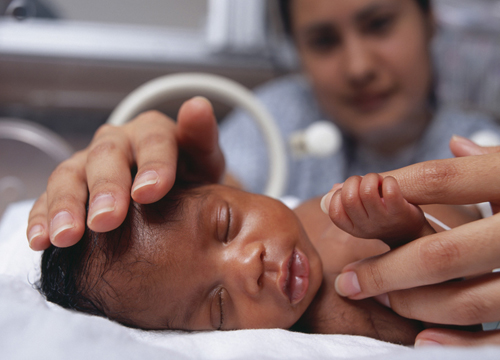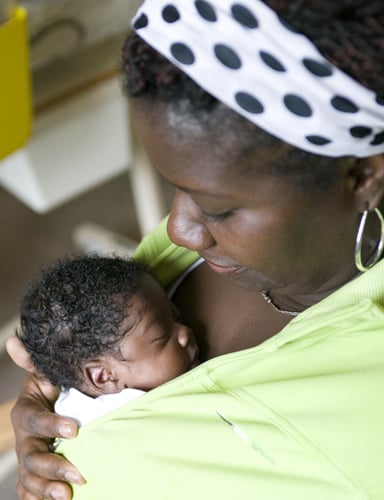Around 10 to 15 percent of all babies born in the US
need to spend time in a neonatal intensive care unit (NICU). Babies most
often need extra care to assist them with breathing until their lungs
have matured.
There are many reasons
why your baby may need special care, the most common one being
prematurity (being born before 37 weeks). Babies may need to spend days,
weeks, or sometimes months in a NICU until they are big enough and well
enough to go home.
Neonatal intensive care unit
If your baby is in a NICU,
this is a particularly stressful time. It helps to understand a bit
about who will be caring for your baby, what they will be doing, and how
to make sure you’re fully informed at all times.
In the US, most hospitals
have a unit to provide special nursing and medical care for babies;
these are divided into three levels depending on the degree of care
offered. Level one is the most basic level. These units don’t provide
long-term ventilatory support, but they are expert at caring for babies
who are slightly premature, need frequent nursing, or have previously
been ventilated and are ready to be transferred to less intensive care.
Level two units ventilate and give intensive care to babies from 26
weeks’ gestation. Level three units offer intensive care for babies born
as early as 23 weeks, and can often do neonatal surgery.
All these units are
staffed by special nurses and doctors who will be happy to show you
around before the baby is born if there is time.
Ward rounds
Most units have
rounds each morning, and the more intensive units will have another
round later in the day. Some allow parents to be present and to ask
questions during rounds, while others prefer parents to wait outside and
then make time to talk to them afterward.
Communication and visiting
You may be able to spend
some time with your baby before he is sent to a NICU. However, if your
baby needs to be on a ventilator, or has another serious problem, he
will be sent immediately to neonatal intensive care, and you may not
have any time together after the birth. You’ll be encouraged to see your
baby as soon as he has been transferred, and if you’re unable to go
immediately, you may be given a photo of your baby.
You should be able to see
your baby any time of the day or night and the nurses will be happy to
update you regularly. The doctors will also give you an update on an ad
hoc basis or arrange to meet you for a more formal chat. Other family
members may be able to visit the unit with your permission.
You will both be encouraged to touch, stroke, and caress your small baby, and to spend as much time as possible talking and singing to him.

Your baby’s care
While your baby is in the
NICU, he may be treated with medication and have various tests and
checkups. In some cases, he will need to be on a ventilator.
Tests and X-rays
Your baby may have blood
tests to check for infection and anemia, to check kidney function,
oxygen, and carbon dioxide levels, sugar levels, and to identify his
blood group. The frequency of these depends on how ill or premature your
baby is. In neonatal intensive care babies need blood tests
periodically. Some babies need an X-ray while they’re there, and very
premature babies often need many chest X-rays and sometimes abdominal
ones.
Assisting your baby
Some babies need a little
extra oxygen, while others need constant oxygen through a nasal tube.
For very premature babies, a tube may be placed into the trachea
(windpipe) and connected to a ventilator that blows oxygen into the
lungs. Babies are monitored to see when they can be weaned off the
ventilator.
Most babies in
intensive care need one or more IVs to give fluids, blood, and
antibiotics. Very small babies may be fed through a long, fine feeding
tube running through the mouth or nose to the stomach. They may also
need at least one blood transfusion, for some cases of conditions like
anemia and jaundice.
Antibiotics are often
given to prevent infection. Some babies need medicine to keep their
blood pressure up, and many who are ventilated need medicine to sedate
them and to prevent or treat pain.
The role of parents
How you can help your baby
For most, the experience of having their baby in a NICU is extremely stressful.
Parents may feel that they have no role in the care of their baby;
however, this is not the case. The most important thing you can do for
your baby is to start expressing breast milk. Breast milk will nearly
always be the best milk for a premature baby and can be stored in a
freezer until needed.
You may be able to
touch and stroke your baby and can be helped to cuddle him while he is
on a ventilator. Babies thrive on skin-to-skin contact, called kangaroo
care. You’ll be encouraged to tuck your baby on your chest inside your
shirt so that he can enjoy a close bond. Talking, reading, and singing
to your baby helps him become familiar with you. You may be able to
change his diaper and help with feedings, even if these are through a
nasogastric tube.
Spend plenty of time with your baby, especially when breast-feeding since this may help the letdown reflex , but save some time for yourself too so that you conserve energy for when you return home with your baby.
Carrying your baby close to your body and enjoying skin-to-skin contact together will help your tiny baby thrive.

Babies who are nursed in a quiet, calm environment progress better
Research shows that
babies who are cared for in quiet units with subdued lighting go home
sooner that those who are nursed in a noisy unit with bright lights on
throughout the day and night.
Your baby’s caregivers
Who’s who on the neonatal unit
Neonatal nurses
Most of the care in a
neonatal intensive care unit is carried out by highly trained nurses.
These include registered nurses and neonatal clinical nurse specialists
who have advanced training. Some intensive care units also have neonatal
nurse practitioners, who have advanced education and training and can
perform many procedures.
Doctors
Neonatologists are the
doctors who run the neonatal intensive care units. These are the doctors
who will coordinate your baby’s daily care plan. They are pediatricians
who have received advanced training to care for sick and premature
newborns. The neonatologist in charge of the department is known as the
attending doctor. In addition to neonatologists, there are often
neonatology fellows and pediatric residents, as well. Neonatology
fellows are pediatricians who are getting advanced training to care for
sick newborns. Pediatric residents are doctors who are being trained in
the specialty area of pediatrics.
Other members of staff
A neonatal intensive
care unit depends on a number of other staff members. These include a
registered dietitian, physical and occupational therapists, technicians
(who can draw blood or take X-rays), pharmacists, and, in some neonatal
intensive care units, a psychotherapist to offer much needed emotional
support to parents.